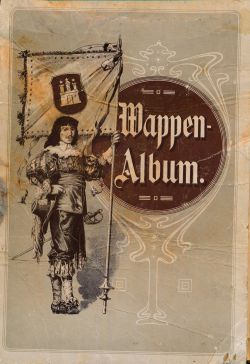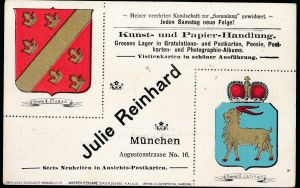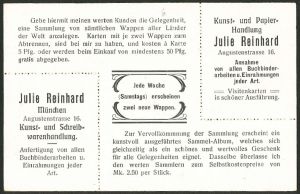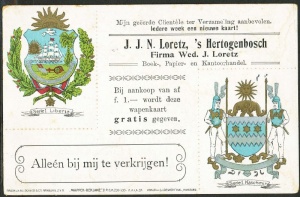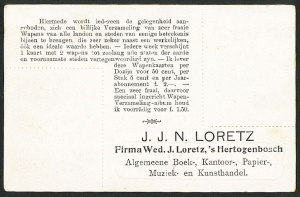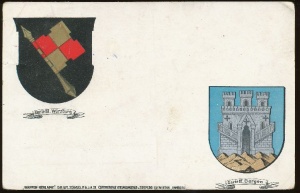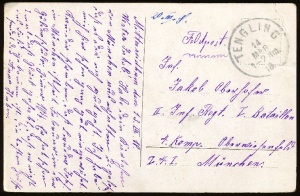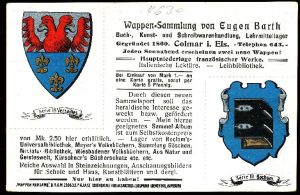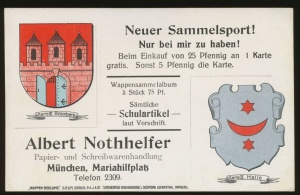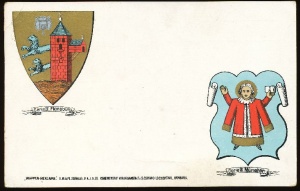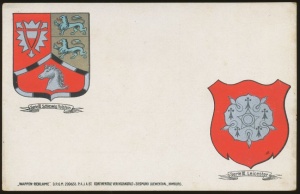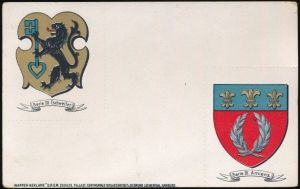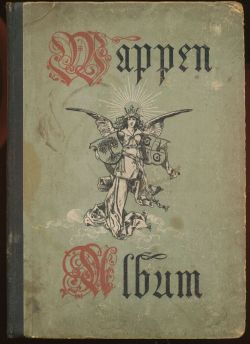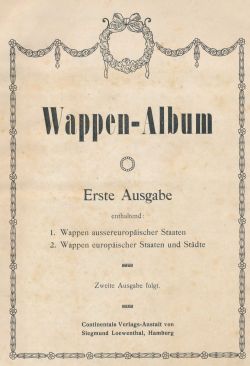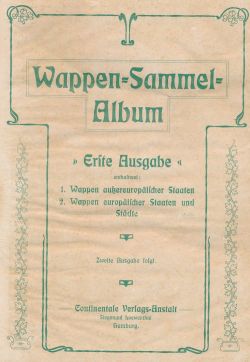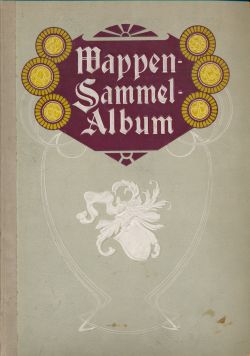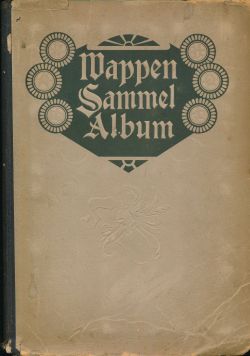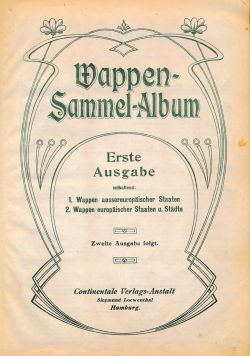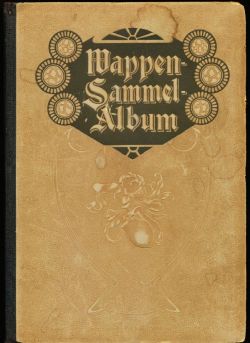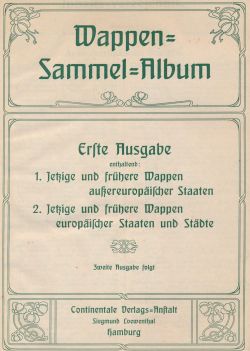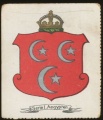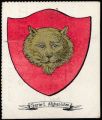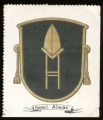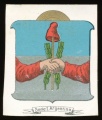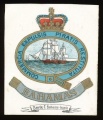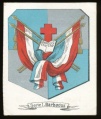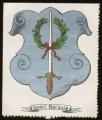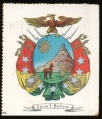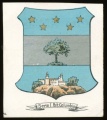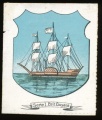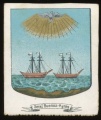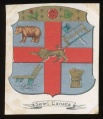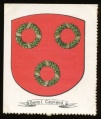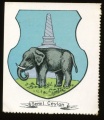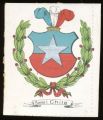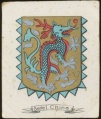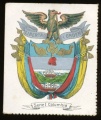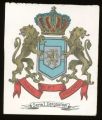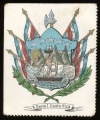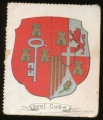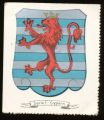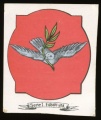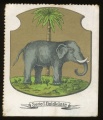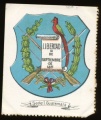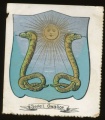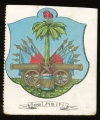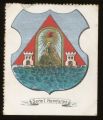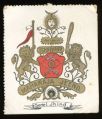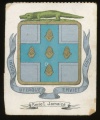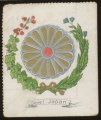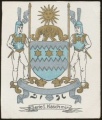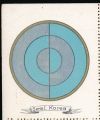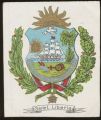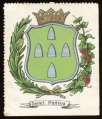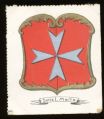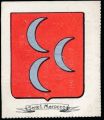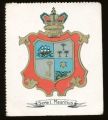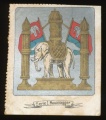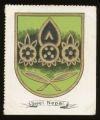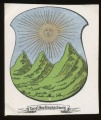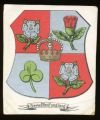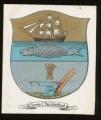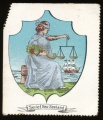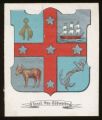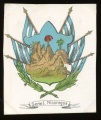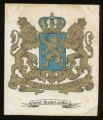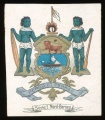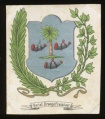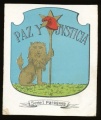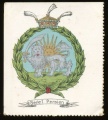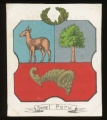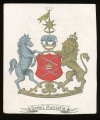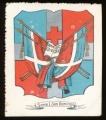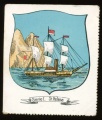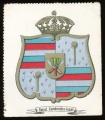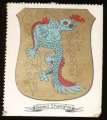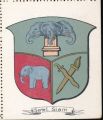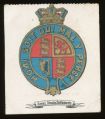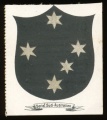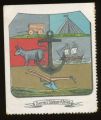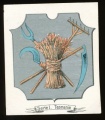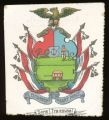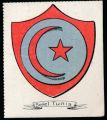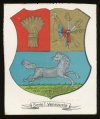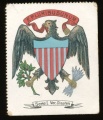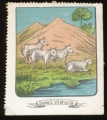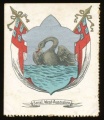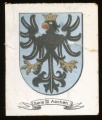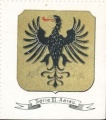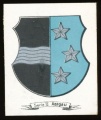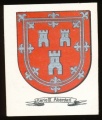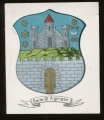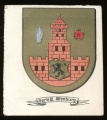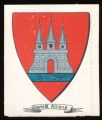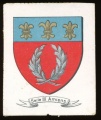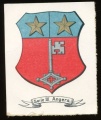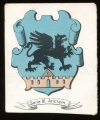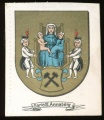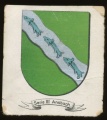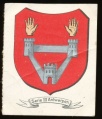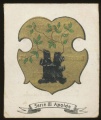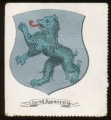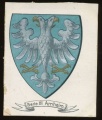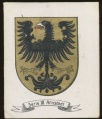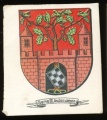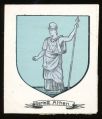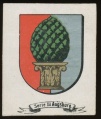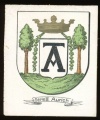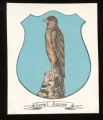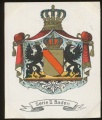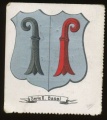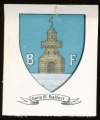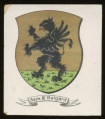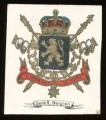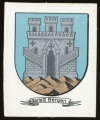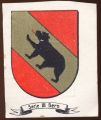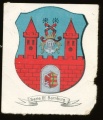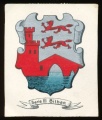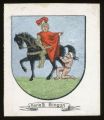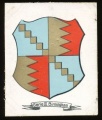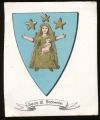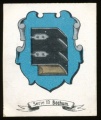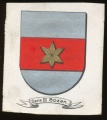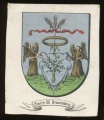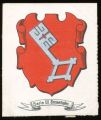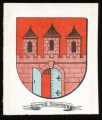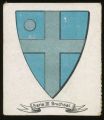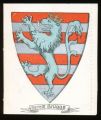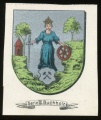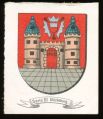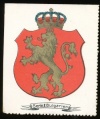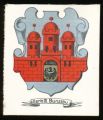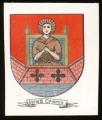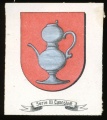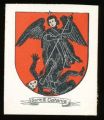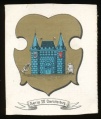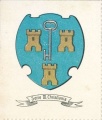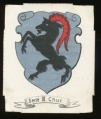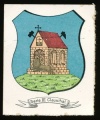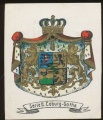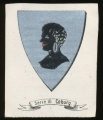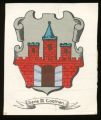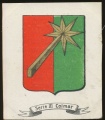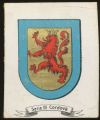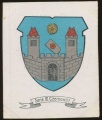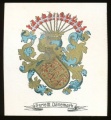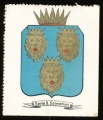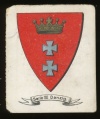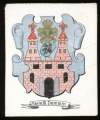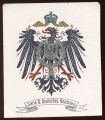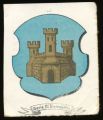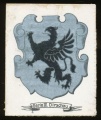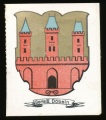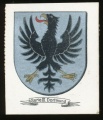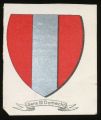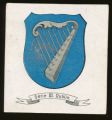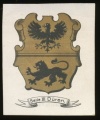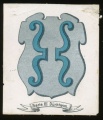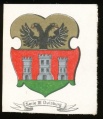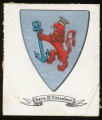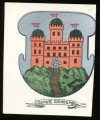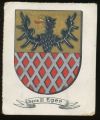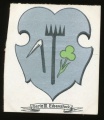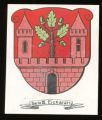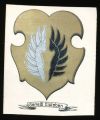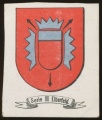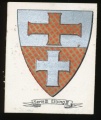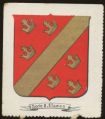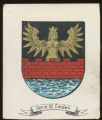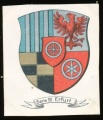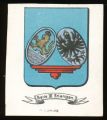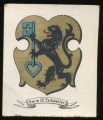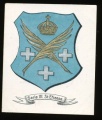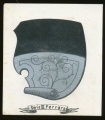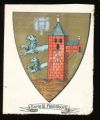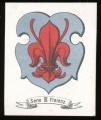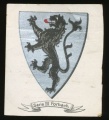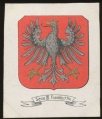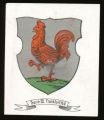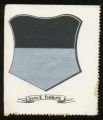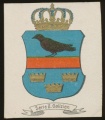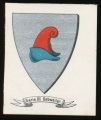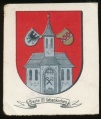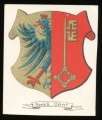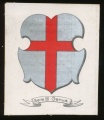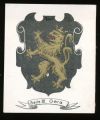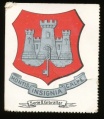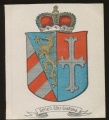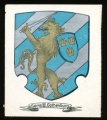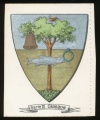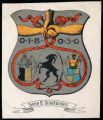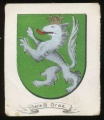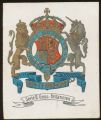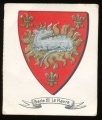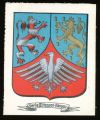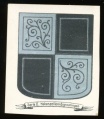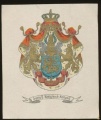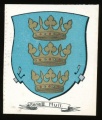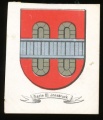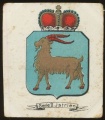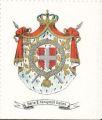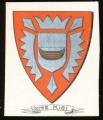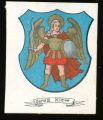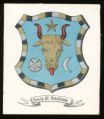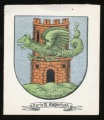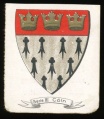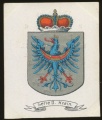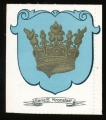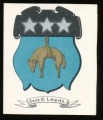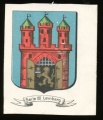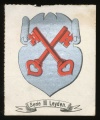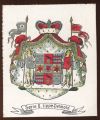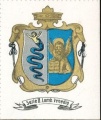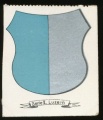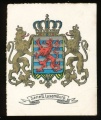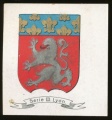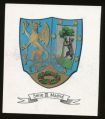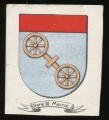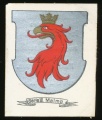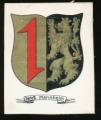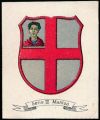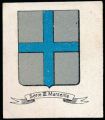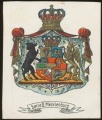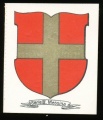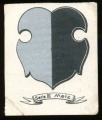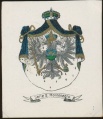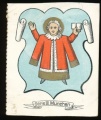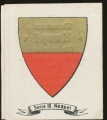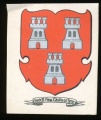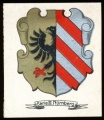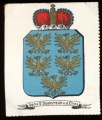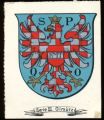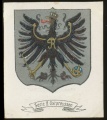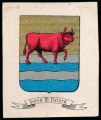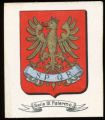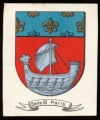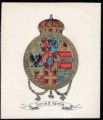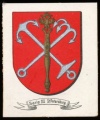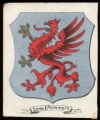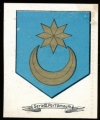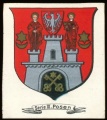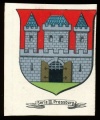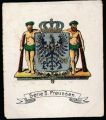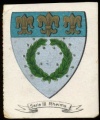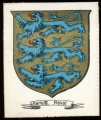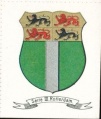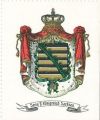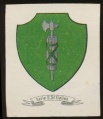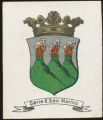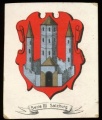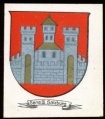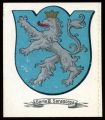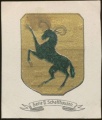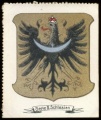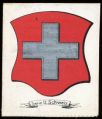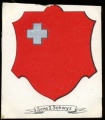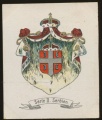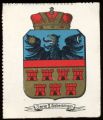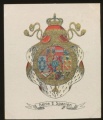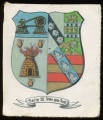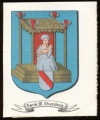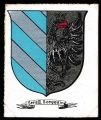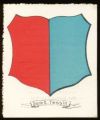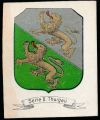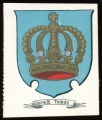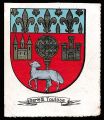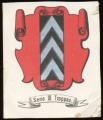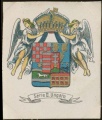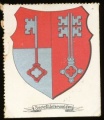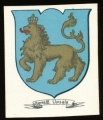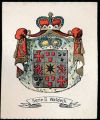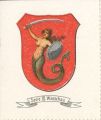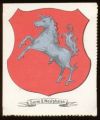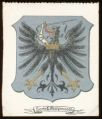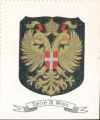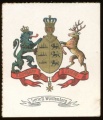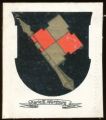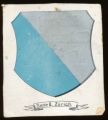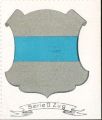Continentale Verlags-Anstalt
| |
Album information :
- Issued by : Many small companies, but printed by Continentale Verlags-Anstalt, Sigmund Loewenthal, Hamburg
- Date of issue : 1903 (Not 1912 as stated in the Köberich catalogue)
- Number of stamps/cards : 480 (?). At least 425. According to the Köberich cataloge only 330 were actually issued (but I have 423 so far, see below and know of 2 more. As they were issued in pairs, most likely there are 426).
- Image variants : so far I know only of 2 real different arms (Auerbach and Glarus), but there are differences in printings, see section Variations
Background
The album was probably issued from 1903 onwards and contained an introduction, followed by 40 pages for 480 images. No date is mentioned anywhere in the album, but the cards bear the number DRGM 209633 (Deutsche Reichs-Gebrauchsmuster), a German copyright/trademark number, issued to Sigmund Loewenthal on July 30, 1903 (see images below from the German trade mark register).
The trademark text reads : Karte aus Papier, Pappe odgl. mit perforierten, mit Wappen beklebten oder bedruckten Feldern, um welche herum Reklamen odgl, angeordnet sind. S. Loewenthal, Hamburg, A-B-Cstr. 45, 30/7 03. (Cards made of paper or similar, with perforated fields, printed or glued with coats of arms, around which advertising is placed. Simon Loewenthal, ABC-street 45, June 30, 1903).
The images could be collected from a large number of small companies in Germany, Austro-Hungarian Empire and Holland (and maybe other countries as well). These companies issued advertising cards, with two images, that could be cut out and placed in the album. According to the cards, one card was issued weekly. With 480 cards that would mean 240 weeks. When they started issuing in 1903, the series could have been completed by 1907.
The album was issued as the first out of a series of two (the second was never issued) and contained the arms of present and former (non-European) countries and European cities.
At least five different album formats for the first album were issued, see below.
The cards were also sold as postcards, without advertisement and perforations.
| Example of a German card |
|
| Example of a Dutch card |
|
| Example of a postcard (posted March 14, 1918) |
|
| Example of a German card from the now French city of Colmar |
Example of a German card from München |
| Example of other postcards |
(non perforated) |
| (perforated) |
Series from one bookshop:
Cards of the following companies are known to me, but there must be many more (if you have any or any information, please contact me) :
- Johann Bach, bookshop, Schöneberg
- Eugen Barth, Books and office supplies, Colmar, Germany (now France)
- Lorenz Beyer, Bookshop, Mittweida, Germany
- Robert Doležal Jr., Bookshop, Arnau an der Elbe, Austro-Hungarian Empire (now Hostinné, Czech Rep.)
- Döscher & Koch, clothing, Stade, Germany
- Hermann Exner, paper and office supplies, Berlin, Germany
- Berta Finking, Schoolsupplies, Wilmersdorf, Germany
- Richard Glaubig, Germania Drogerie, Drugstore, Zehlendorf, Germany
- Willy Gross, paper supplies and book binders, Dresden, Germany
- Hamburger & Bredtmann, office supplies, Pforzheim, Germany
- Engelb. Hanel, School and papersupplies, Wiener-Neustadt, Austro-Hungarian Empire (now Austria)
- Georg Hoehn, Bookshop and printers, Pirna, Germany
- Anna Kleinitzer, School supplies, Vienna, Austro-Hungarian Empire (now Austria)
- Knopf Warenhaus, Diedehofen, Germany
- J.J.N. Loretz, Book- and artshop, 's Hertogenbosch, Holland
- Arno Loth, School supplies, Rosenheim, Germany
- A. Mercklein, book and papershop, Ueckermünde, Germany
- Arthur Müller, bookshop, Rixdorf, Germany
- Otto Müller, Paper and leather goods, Rixdorf (now part of Berlin), Germany (2 types)
- Alfred Nautze, printers, Pirna, Germany
- August Peter, Coffee, tea and other foods, Halle an der Saale, Germany
- Sebastian Pohl, Butcher, Vienna, Austro-Hungarian Empire (now Austria) (2 types)
- Herman Protz, Bookshop, Rixdorf bei Berlin, germany
- Julie Reinhard, Book- and artshop, München, Germany
- Arthur Schultz, butter and cheese shop, Rixdorf, Germany
- Alb. Schwarzer, office supplies, Berlin W., Germany
- Jos. Joh, Schweizer, Bookshop, Leitmeritz, Austro-Hungarian Empire (now Litoměřice, Czech Rep.)
- Wilhelm Wartenberg, Bookshop, Friedenau, Germany
- unknown issue : back states only Tees, Kakao, Schokoladen (tea, coffee, chocolates)
- unknown issue : back states only Nähr- und Stärkungsmittel für Kinder und Rekonvaleszenten (food for children and for recovering)
- Several companies issued cards without text on the back of the stamp
For an overview of all countries and cities represented, see the introduction to the album (pdf).
Albums
At least five different album formats for the album were issued.
The oldest versions of the album were simply named Wappen-Album. Later versions were named Wappen-Sammel-Album.
All albums have the same set-up : a front page, followed by an 8-page index of all arms and then 20 pages to glue or stick the images. All indicate that it is the first album, but the second was never published (see above).
There are no indications to the dates when the different albums were published. As the cards could be collected over a long period of time, the cards inside each album can not be used for dating a specific album. The five albums that I am aware of, can be placed in a logical sequence though, based on name and population figures.
Album 1
Album 1 has on the cover a female figure holding two (unidentified) coats of arms. The first page and index is in black. Population figures are identical to albums 2, 3 and 4, but lower as in album 5. The population figures listed correspond to figures in Wikipedia from around 1900, just before the album was supposedly published (1903-1905).
The section for the cards is printed in green, with a vertical leaf-based decoration between the cards and single borders around the cards.
| |
|
The index of this album : File:Index1.cva.pdf
Album 2
Album 2 has on the cover a soldier in 17th century style holding a banner with the arms of Hamburg, as the publisher was based in Hamburg. The index is in green, but the content and population figures are identical to album 1,3 and 4, with only minor differences in the text. The cover states Wappen-Album, the index already Wappen-Sammel-Album, hence this album is listed as second.
The section for the cards is printed in green, with straight double borders around the cards and no vertical or horizontal lines or decorations.
| |
|
The index of this album : File:Index2.cva.pdf
Album 3
Album 3 has as title Wappen-Sammel-Album and under the title is an empty embossed shield. The cover page is multi-coloured. The index is in green, with a smaller typeface as in albums 1,2,4 and 5. The population figures are identical to album 1 and 2, but there are some small textual differences. For example : the Sandwich Islands are 'als Königr. Hawai gen." (meaning: known as the kingdom of Hawai) in album 1, 'als Königr. Hawai genannt" in album 2 and 4 and 'als Köningreich Hawai genannt" in album 3 and 5. As it has the same name and design as album 4, it is of a later date as the previous 2 albums and thus listed as album 3.
The section for the cards is printed with white texts and green double/triple borders around the cards, the middle vertical lines going all over the page, ending in top in a leaf-like decoration.
| |
|
The index of this album : File:Index3.cva.pdf
Album 4
Album 4 is, with album 5, the most commonly seen album. The cover design is identical to album 3 and 5. Index is printed in green with a different lay-out and similar population figures as compared to albums 1-3. Some small other textual changes.
The section for the cards is identical to album 5. Due to the lower population figures and similarity of the design of the first index page with album 3, it is listed as album 4.
| |
|
The index of this album : File:Index4.cva.pdf
Album 5
Album 5 is the most commonly seen album. The cover is identical to album 3 and 4, but monochromatic black/brown. Index is printed in green with a different lay-out and updated population figures as compared to albums 1-4, hence it is the newest album. Some small other textual changes.
The section for the cards is identical to album 4.
| |
|
The index of this album : File:Index5.cva.pdf
Images
Not all images may have been issued !
- Not issued ?
Alessandria
- Not issued ?
Allenstein
- Not issued ?
Ancona
- Not issued ?
Anhalt
- Not issued ?
Arnsberg
- Not issued ?
Astrachan
- Not issued ?
Bautzen
- Not issued ?
Bayreuth
- Not issued ?
Belfast
- Not issued ?
Besançon
- Not issued ?
Bielefeld
- Not issued ?
Bonn
- Not issued ?
- Not issued ?
Cadix
- Not issued ?
Calbe
- Not issued ?
Cambridge
- Not issued ?
Charkow
- Not issued ?
Cleve
- Not issued ?
Constantinopel
- Not issued ?
Crimmitschau
- Not issued ?
Crossen
- Not issued ?
Culm
- Not issued ?
Dobreczin
- Not issued ?
Dessau
- Not issued ?
Drontheim
- Not issued ?
Dundee
- Not issued ?
Eberswalde
- Not issued ?
Einbeck
Elberfeld
(shows arms of Elmshorn)Elmshorn
(shows arms of Elberfeld)- Not issued ?
Emmerich
- Not issued ?
Essen
- Not issued ?
Fiume
Glarus (Series 3)
Glarus (variation, Series 2)
- Not issued ?
Haarlem
Hannover (city)
- Not issued ?
Helsingfors
- Not issued ?
Island
- Not issued ?
Königsberg
- Not issued ?
- Not issued ?
Mailand
- Not issued ?
Malaga
- Not issued ?
Manchester
- Not issued ?
Meiningen
- Not issued ?
Modena
- Not issued ?
Neapel-Provinz
- Not issued ?
Nizza
Oldenburg city
- Not issued ?
Oporto
- Not issued ?
Ravenna
Sachsen (kingdom)
Sachsen (province)
Salzburg (city)
Salzburg (state)
- Not issued ?
Saratow
- No image
Sheffield (has been issued, not in my possession)
- Not issued ?
Schwarzburg-Rudolstadt
- Not issued ?
Schwarzburg-Sonderhausen
- Not issued ?
Schwerin
- Not issued ?
Sevilla
- Not issued ?
Silicien
- Not issued ?
Stettin
- Not issued ?
Stockholm
- No image
Turin (has been issued, not in my possession)
- Not issued ?
Verona
- Not issued ?
Wilna
Variations
Two stamps have been issued with a real different design; Auerbach and Glarus, see below.
Contact and Support
Partners:
Your logo here ?
Contact us
© since 1995, Heraldry of the World, Ralf Hartemink 
Index of the site

